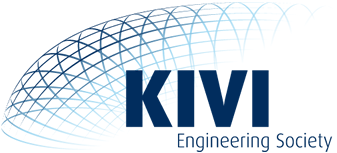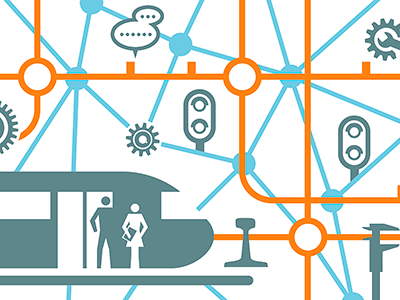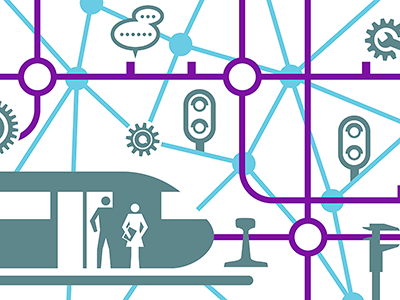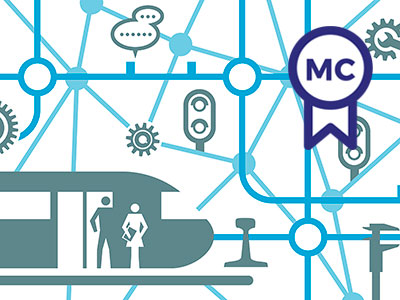Overview
This course will equip you with the knowledge and skills needed to apply a systems approach to railway engineering and a proactive approach to problem solving. This will enable you and your organization to make smarter choices when dealing with current or potential problems. It will also strengthen your ability to think systematically, prevent problems or deal with them more efficiently and improve the railway system as a whole.
This course is part of our railway engineering series which focuses on an integrated perspective to the practical resolution of daily challenges to achieve a more reliable, safe and high-comfort railway network, transporting people and goods in a fast and efficient way.
Design – Operations – Performance
The central element of this course is 'design', while the two other content courses are dedicated to 'operations' and 'performance'. A final fourth course will integrate all three topics.
Fundamental to railway operations is the interaction between track and train to create a smooth journey from A to B. During these six weeks, we will take a closer look at:
1) Elements, properties and types of vehicle and track
2) Contact patch and interface between wheel and rail, pantograph and catenary wire
3) Traction and energy and the challenges of transition zones and civil engineering structures
Dealing with railway issues today
Using practical examples, you will experience and examine the key aspects of railway systems and the complex interfaces and interactions between infrastructure and rolling stock.
After taking this course, you will be able to apply the system knowledge of railway interfaces and interactions that you have acquired to design new solutions to real-life problems or make suitable adjustments when elements of these interfaces change.
Since there can be many appropriate solutions, managerial or executive decisions often involve compromise. During this course, you will learn to use tools to support your decisions and make a strong case for your proposed solutions.
After taking this course you will be able to:
- Analyse the interfaces and interaction of track and train and their effects on the railway system, with an understanding that dependencies of the system mean one change will require an understanding of the adjustments required as a consequence.
- Identify opportunities to improve the performance and reliability of a railway network, based on your analysis of interfaces and interactions between track, train, traction and civil structures.
- Use basic calculations, models and tools to support your proposed solutions.
- Engage in technical discussions, even beyond your specific field of expertise, supported by essential knowledge and detailed appreciation of the interfaces involved in moving trains.
This course is part of our Professional Certificate Program in Railway Engineering, endorsed by:

Note: This course is offered twice a year, usually in March and September.
Details
Course Syllabus:
Week 1: Vehicle-Track Interaction
How do forces acting on the vehicles and the tracks, influence their design and performance? How can innovations in track designs be best implemented?
Week 2: Traction and Energy
One thing has never changed and will never change in transport: all forms of transportation require energy to move. How much energy do the vehicles need for a particular operation and why? Where does the energy go and how does it affect the vehicles and the tracks? How does efficiency relate to resistance during a train ride? These and other questions will be answered this week.
Week 3: Wheel-Rail Interface
Most of the problems in railway systems nowadays originate in the wheel-rail interface, such as: broken rails, crossings, and wheels. These are the main source of disruptions in a railway network. What is at the root of all these problems? Is it possible to avoid them or reduce their negative effect and how? In this week, you will find the answers to these questions.
Week 4: Track-Vehicle-Pantograph Dynamics
How can you deal with the dynamic forces, the noise and vibration resulting from a moving vehicle which affect the system? In this week, we will look at vehicle behaviour, starting with train-track interaction in the form of hunting. Then, the pantograph-catenary system will be investigated. Moreover, vibrations at different scales will be explained, which are important for the interface with the neighbours and environment. These interactions and their consequences for the railway design as a whole will be discussed in detail.
Week 5: Interface with Civil Structures
What considerations in designing your railway system need to be taken into account to mitigate the effects of bridges, tunnels, soil properties, level crossings and transition zones in a railway network?
Week 6: Case Study
We challenge you to apply your knowledge of the whole course to analyse a case study on railway design. In this case, a railway line crosses five locations, each with its own challenges: level crossing, bridge, swamp, passing station and a mountain passage. For each, we will consider five possible technical challenges that might affect this ride: track structure, resistances and energy, welds, noise and vibrations and soil. The main goal is to identify the positive and negative points in this system, and to examine how to deal with the facts in a system to solve this. This systems approach to engineering will give you insight into how all the knowledge you learned is connected within the railway system.
Follow our full program
This course is one of a series of professional education courses devoted to railway engineering. If you are interested in developing a comprehensive and integrated systems perspective on railway engineering, join the full Professional Certificate Program, which consists of three courses and a Capstone Project.
The subsequent courses in this series are:
- Railway Engineering: Real Time Operations
- Railway Engineering: Performance over Time
- Railway Engineering: Capstone Project
Overall, this full program will enable rail professionals in managerial or advisory roles to develop a good operational understanding of a systems view of railway networks to enhance the quality of their investment decisions, innovation initiatives, analysis of technical failures, project documentation and system optimization.
Qualifications
Certificates
If you successfully complete this course, you will earn a professional education certificate and you are eligible to receive 3.0 Continuing Education Units (CEUs).
Microcredential
if you successfully complete all the courses that are part of our Railway Engineering series (Track and Train Interaction, Real Time Operations, Performance over Time, and Capstone Project), you will be entitled to a Microcredential. For more information on Microcredentials visit this page.
Chartered Engineering Competences
All our online courses and programs have been matched to the competences determined by KIVI’s Competence Structure, a common frame of reference for everyone, across all disciplines, levels and roles.
These competences apply to this course:
- A1: Extend your theoretical knowledge of new and advancing technologies.
Admission
This course is primarily geared towards working professionals.
To fully benefit from this course, you should have basic knowledge and working experience in railways.
Interested in enrolling in our full program?
This course is part of our Professional Certificate Program in Railway Engineering, which consists of three career-oriented courses plus a capstone project. If you enroll in the full program you can benefit from our package price: € 1600 (saving up to € 400) - read more.
This program has been designed so that knowledge is acquired gradually. Therefore, if you wish to pursue this program you are expected to follow the courses in the order presented on the program website.
Order of courses:
- Railway Engineering: Track and Train Interaction
- Railway Engineering: Real Time Operations
- Railway Engineering: Performance over Time
Contact
If you have any questions about this course or the TU Delft online learning environment, please visit our Help & Support page.



